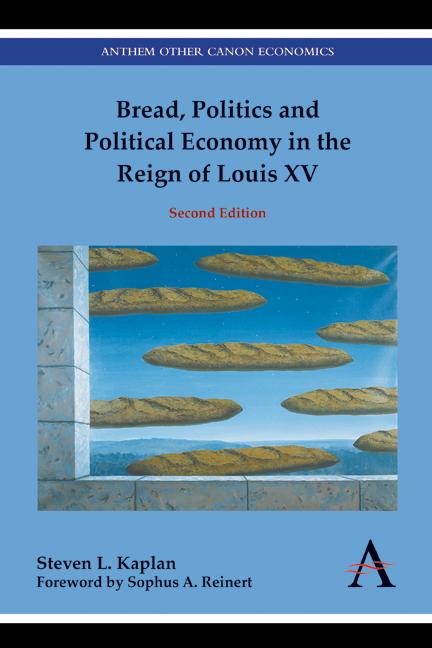Book contents
- Frontmatter
- Contents
- List of Illustrations
- Foreword to the Second Edition
- Acknowledgements
- List of Abbreviations
- Introduction
- Chapter I The Police of Provisioning
- Chapter II The Regulations and the Regulators
- Chapter III The Origins of Liberty
- Chapter IV The Response to Liberalization: Theory and Practice
- Chapter V Forcing Grain to Be Free: The Government Holds the Line
- Chapter VI The Reforms and the Grain Trade
- Chapter VII Paris
- Chapter VIII The Royal Trump
- Chapter IX The Government, the Parlements, and the Battle over Liberty: I
- Chapter X The Government, the Parlements, and the Battle over Liberty: II
- Chapter XI From Political Economy to Police: The Return to Apprehensive Paternalism
- Chapter XII Policing the General Subsistence, 1771–1774
- Chapter XIII The King's Grain and the Retreat from Liberalization
- Conclusion
- Bibliography
- Index
Introduction
- Frontmatter
- Contents
- List of Illustrations
- Foreword to the Second Edition
- Acknowledgements
- List of Abbreviations
- Introduction
- Chapter I The Police of Provisioning
- Chapter II The Regulations and the Regulators
- Chapter III The Origins of Liberty
- Chapter IV The Response to Liberalization: Theory and Practice
- Chapter V Forcing Grain to Be Free: The Government Holds the Line
- Chapter VI The Reforms and the Grain Trade
- Chapter VII Paris
- Chapter VIII The Royal Trump
- Chapter IX The Government, the Parlements, and the Battle over Liberty: I
- Chapter X The Government, the Parlements, and the Battle over Liberty: II
- Chapter XI From Political Economy to Police: The Return to Apprehensive Paternalism
- Chapter XII Policing the General Subsistence, 1771–1774
- Chapter XIII The King's Grain and the Retreat from Liberalization
- Conclusion
- Bibliography
- Index
Summary
I
Modern times has invented its own brand of apocalypse. Famine is no longer one of the familiar outriders. The problems of material life, and their political and psychological implications, have changed drastically in the course of the past two hundred years. Perhaps nothing has more profoundly affected our institutions and our attitudes than the creation of a technology of abundance. Even the old tropes have given way: neither dollars nor calories can measure the distance which separates gagne-pain from gagne-bifteck.
Yet the concerns of this book seem much less remote today than they did when it was conceived in the late sixties. In the past few years we have begun to worry, with a sort of expiatory zeal, about the state of our environment, the size of our population, the political economy and the morality of the allocation of goods and jobs, and the future of our resources. While computer projections cast a Malthusian pall over our world, we have had a bitter, first-hand taste of shortages of all kinds. The sempiternal battle between producers and consumers rages with a new ferocity, as high prices provoke anger on the one side and celebration on the other. Even as famines continue to strike the Third World in the thermidor of the green revolution, so we have discovered hunger in our own midst. The historian of pre-industrial Europe has always been able to find analogies and metaphors in press reports from Asia and Africa about “famine plots,” crowds pillaging storehouses, governments promulgating draconian measures against food hoarders and speculators, and famished consumers obdurately rejecting unfamiliar staple substitutes. Now the historian experiences the same eerie feeling of déjà-vu when he reads front-page articles in the New York Times about monstrous international wheat deals. Now that scarcity looms as part of our future, it is easier to make the case that it is also a heritage of our past—a heritage worth knowing, if not commemorating. Though we are not terrified by the same fears that obsessed our ancestors, we now have a keener sense of the burdens of subsistence and survival.
The subsistence problem dominated life in old-regime Europe in a merciless and unremitting way. No issue was more urgent, more pervasively felt, and more difficult to resolve than the matter of grain provisioning.
- Type
- Chapter
- Information
- Bread, Politics and Political Economy in the Reign of Louis XV , pp. xix - xxxivPublisher: Anthem PressPrint publication year: 2015



